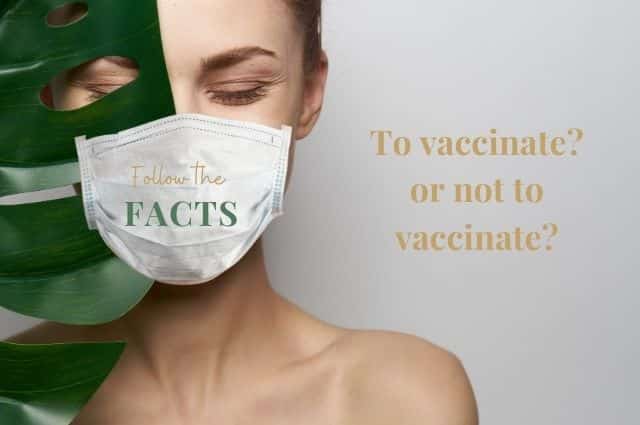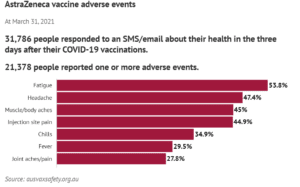
04 May What do we know in Australia about risk?
To vaccinate or not vaccinate?
COVID has been terribly frightening for all of us and thus the conversation around this has become incredibly polarising. I am not an anti-vaxer. I am pro good health and following the science, as well as pro-choice.
What do we know in Australia about risk?
The World Health Organization has listed all anti-COVID-19 vaccines for emergency use.
All current vaccinations are currently going through rigorous testing processes.
Current vaccinations are released without normal rigorous testing for a vaccine due to the emergency status of the pandemic.
This includes the following: Moderna, Pfizer, Astrazeneca, serum institute of India and Janssen.
Since the Australian national rollout began on February 22, AusVaxSafety has tracked the safety of the Pfizer and AstraZeneca vaccines among Australia’s population using surveys of vaccinated people sent via text and email.
The data so far includes responses from people three days after their first AstraZeneca shot, and three and eight days after the Pfizer shot.
Genetics may provide a link to reducing risk.
Research mapping genetic markers is being used to save lives at risk from a range of medical treatments, tests and vaccines.
All new medical treatments go through a stringent set of experiments, trials and approval processes before being passed for general use. However, adverse drug reactions caused by drug hypersensitivity continue to be a significant problem in clinical practice today. We cannot predict the severity of ongoing reactions to emergency medicines as well as those that have been approved by the TGA for mainstream non-emergency use due to their experimental nature and lack of trial time.
Professor Elizabeth Phillips is leading the Drug Hypersensitivity Research Group at Murdoch University investigating genetics and mechanisms behind adverse reactions to find new ways of preventing, diagnosing and treating drug hypersensitivity.
The group has been instrumental in preventing fatal hypersensitivity in patients taking abacavir for example, a common drug used to treat HIV symptoms, after confirming the hypersensitivity was related to a specific gene.
“Through the design of innovative and inexpensive genetic testing assays, followed by blinded clinical trials, we demonstrated conclusively that abacavir hypersensitivity could be prevented across different races by screening for the HLA-B*57:01 gene,” said Professor Phillips.
“Our research has provided a roadmap from discovery to translation of pre-prescription genetic screening into routine clinical practice to make prescription drugs safer.”
Now, HIV patients around the globe are screened for the hypersensitivity gene prior to commencing abacavir treatment as part of routine HIV care.
We still do not know what genes are going to predispose patients to reactions to the COVID vaccine, however, if you are concerned please discuss this with your chosen health provider.
Source: Murdoch education news April
How do we mitigate risk?
Research
There is evidence that some specific probiotics can alter monocyte and natural killer cell function in the blood. Evidence is also accumulating that taking some specific probiotics can boost antibody responses to oral and systemically administered vaccines. The effect when shown is modest and is not always seen in different studies to all vaccines, but there is enough of a trend to make the area worthy of further investigation, particularly to tease out the mechanisms involved.
Source: Proceedings of the Nutrition Society , Volume 69 , Issue 3 , August 2010 , pp. 442 – 446
Anecdotal
In clinic, I use an anti-inflammatory homeopathic call R1. There is absolutely no research to support, it’s use for reducing side effects of vaccine. What I can tell you anecdotally is that babies who take R1 together with a probiotic tend to suffer less fevers and other side effects from vaccinations. Having said that this could be due to the fact that the mothers I see will also focus on improving their lifestyle and diet, so this as well as a multitude of other variants could be factors.
For further information on this medicine go here: www.homeopathicmedicine.info/en/reckeweg-r1/
4 Things to do before you get vaccinated
The check list I give patients who are heading in for any vaccination is the following.
- Make sure your full blood count is normal as this reflects immune competence.
- Make sure liver and renal function are optimum.
- Ensure vitamin D levels are >80
- Take a mushroom extract, R1 and a probiotic for a week prior and post.
Ps. Want a quick, easy way to reduce stress and apply self-love? 10 minutes of yoga a day is proven to have more stress reducing effects than 1 hour of a week.
Visit this link for your daily yoga practice
Disclaimer: I am not a medical practitioner, and this article is not meant as medical advice rather as information to help you make informed choices about your health.
Looking for a good Naturopath in Perth to be on your team?
Book a FREE scoping session by clicking the ‘book appointment’ button below or call 0488 854 005

